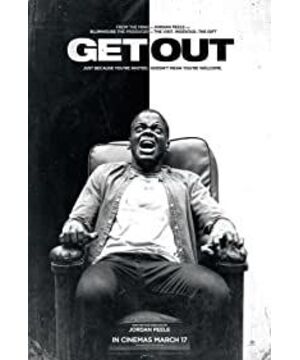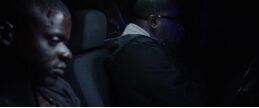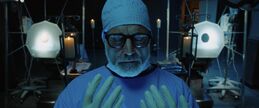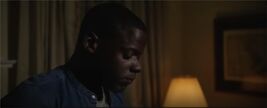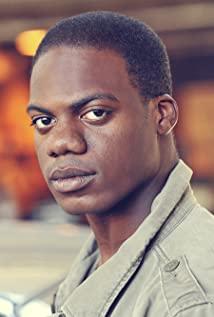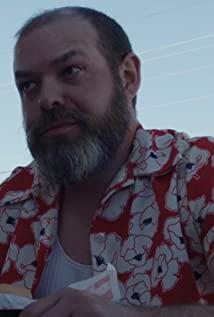Everything is false
Summary: "Get Out" is directed by Jordan Peele and released in the United States in 2017. It tells the story of black Chris and his white girlfriend Ruth when they get along, and find themselves falling into a vicious racial conspiracy. s story. The film shows Chris's gradual loss of "I" in the process of being hypnotized in an unfamiliar environment through various details. This article will start from the perspective of psychoanalysis, using methods such as unconscious theory, instinct theory, dream theory and other methods to combine audio-visual language The scenes and sounds in the film are analyzed by the director's control of the details of the characters being hypnotized and the various audio-visual elements on the screen, so as to see the film's characterization, atmosphere creation, and plot fabrication. and aesthetic value.
Keywords: Get Out, Jordan Peele, Psychoanalysis, Postmodernism
The narrative of the protagonist Chris' experience in "Escape from the Dead" begins when his white girlfriend invites him to a dinner party at her house. When Chris arrives at his girlfriend's house, he begins to discover that something is wrong with the house. Female black slaves often become insane. Looking at the male protagonist, there are many scenes of black slaves looking directly at the camera and breaking the fourth wall. The director uses this technique to convey the characters' emotions to the auditorium, and experience the inner feelings of the female black slave while creating a sense of discomfort. The complex and fearful emotions of the characters help to shape the image of the victim and the development of the secrets discovered by the male protagonist in the subsequent plot. When Ruth's mother hypnotized Chris, she also dispatched the actors' eyes to let the audience deeply feel that Chris's psychological defense line was broken step by step. Ruth's mother put pressure on Chris to introduce him into his heart. The feared things and emotions, the special sound made when the teacup and the teaspoon rubbed, made the last bit of alertness in his heart be exhausted. Under the influence of his girlfriend's mother's hypnotism, Chris's preconscious was gradually disintegrated, and he entered a state of hypnosis.
1. Scenarios promote in-depth awareness
The study of human unconsciousness is an important research field of Freud's psychoanalysis. The theory of unconsciousness in human unconsciousness is mainly divided into consciousness, preconsciousness and unconsciousness. The preconsciousness is an important breakthrough in the hypnotization of Chris by Ruth's mother. , to defeat the preconscious mind, you can easily hypnotize the black Chris. Before Chris was hypnotized, the screen mainly showed medium and close-up shots, which not only showed the distance between the two characters, but also used to highlight the subject and emphasize certain details. When Chris came in smoking from outside, he used a medium close-up shot to show the character's embarrassment after being caught by Ruth's mother smoking, creating a sense of communication, but at this time the scenes of the conversation between the two quickly alternated. , which enhances the rhythm of the film while being slightly oppressive, suggesting that the story goes in an unusual direction. The scene of Chris and Ruth's mother's communication has always been a close-up scene, including the two seemingly leisurely and skillfully discussing the topic of "a pocket watch hypnotizes people". Ruth's mother is sitting calmly in the chair, holding a cup of coffee, slowly stirring the cup with a coffee spoon, making a special sound, an over-the-shoulder medium shot is enough to show that Ruth's mother is at this moment. dominance of the situation. When the two talk about Ruth, the mother's shot turns into a close-up, and after this one of the few shots that touches the softness of the mother's heart, comes the brutal destruction of Chris' preconsciousness. Introducing this event protected by Chris's preconsciousness from Chris's mother - when Chris was a child, his mother had an accident. In order to escape the fact, he did not even help her mother from disaster, but watched with the rain curtain blankly. television. The camera breaks the calm and ripples at this time. A close-up shot of the coffee cup being stirred. Chris's red eyes gradually become larger, gradually advancing from close-up to close-up, from the outer surface into the character's heart, "I'm just sitting there" A few short words made Chris gradually recall something in the past that he never wanted to be picked up by memory.
The role of the foreconscious is to remove things that people do not accept at the conscious level and suppress them into the subconscious. The effect cannot be played, and the memory is retrieved. Everything Ruth has done at present is to break through Chris's pre-consciousness and find out what he really fears in his heart, so that Chris gradually loses his "self" and returns to the state of "ego", that is, to feelings. No longer suppressed, so exposing consciousness to Ruth's mother will naturally be hypnotized. Just as dream work is to disguise subconscious instinctual desires, filmmaking is also to transform repressed instinctual desires into works of art that others can appreciate. After Chris was hypnotized and "immobilized", he used a panoramic or even distant view to show the state of his body and his heart. His body slowly sank into the dark, and the immobile body jumped alternately with the close-up of his eyes. Scissor, showing the condensed fear in front of the audience, this is the real alienation of Chris under the hypnosis of Ruth's mother, and in the face of this collision with tradition, the depression of the sofa gradually sinks, and the stream of consciousness begins to wreak havoc on the screen , Although everything in Chris's eyes is reappearing in front of his eyes or what he sees and thinks is false, but there is no lack of postmodern aesthetic pursuit, breaking dreams and pictures, breaking frames and dimensions.
2. The sound-driven mirror stage
In the second semiotics of movies, there is a psychological relationship between movie images and movie viewers. When the audience watches a movie, they will give themselves a psychological suggestion with the development of the movie plot, just like a play on the screen. The audience also staged a play in their hearts through the visual stimulation of the eyes and the auditory stimulation of the ears, but this play added the audience's own consciousness and understanding, and used their own values and aesthetics to express the theme that the director wants to convey. Jin re-creates works of art, which is also in line with the concept of accepting aesthetics.
Sound can independently have rich expressive power. It is not only an additional attribute of the picture, but can completely become an independent sound image. The use of sound enhances the possibility of continuous evolution and continuous exploration of film language. The sound in the environment can greatly increase the sense of space in the two-dimensional picture and break the sense of the ground plane of the two-dimensional picture. In the scene where Chris was invited by Ruth's mother to sit down and chat for a while after smoking a cigarette, the background sound was the sound of insects at night. In addition to explaining the time of the plot, it also extended and extended the space. The sound effects of life scenes also enhance the audience's sense of substitution and reduce the unfamiliarity of the stage. After the male protagonist Chris sat down, Ruth's mother picked up the coffee cup and began to stir slowly. The cup spoon collided with the inner wall of the coffee cup and made an intriguing sound, which slowly made the male protagonist and the audience relax their vigilance. The voice that was vague at first gradually increased as the two talked. The sound image can trigger the audience's imagination of the image, and the performance effect is far more than the directly presented image. When Ruth's mother asked Chris to recall the scene when his mother died when he was a child, Chris said that it was on a rainy day and he was watching TV while listening to the sound of rain. Although the picture did not cut to Chris's childhood, the sound of rain It has begun to be integrated into the screen. The addition of the voice-over enriches the content of the characters' dialogues and makes the content that the whole picture wants to convey more contagious. Chris's experience of losing his mother when he was a child is more contagious, allowing the audience to rehearse such a scene in their hearts. , this is the mirror effect stage of "Lacan", which can also be said to be the psychoanalysis of film. In the analysis of dreams, psychoanalysis talks about the relationship between the audience and the dream, while psychoanalysis in the movie talks about the subject and the "dreamer". This dreamer is like taking risks in a dream. The ritual sense of "turning off the lights" in the cinema is used to complete the psychological suggestion of dreams before going to bed.
The most visually and aurally impactful clip is when Chris lost his preconscious and recalled childhood events during the hypnosis process. His fingers unconsciously scratched on the sofa, just like when he was a child, he scratched the head of the bed weakly and sensibly. wood, scratching it with your fingers. A quick clip of the picture and the sound of fingers scratching the wooden headboard were used for the sound of Chris scratching the sofa. Although the sound of the wooden headboard and the sofa being scratched by fingers are not the same in real life, the director used the sound of the two. The sound was assimilated into the sound of the wooden bedside being scratched by nails. At this time, Chris was in a state of alienation. Facing the extreme alienation of the characters' feelings and behavior, and Chris's struggle against reason, the director assimilated different sounds. Such a dualistic approach makes the audience unconsciously attracted by the contradiction between alienation and assimilation, which once again produces a contradictory psychological effect in their hearts. The struggle with reason is central to the postmodern aesthetic experience, and Griffin says postmodernism "is a broad mood, not a common dogma." The same is true for alienation and assimilation. They should have no dogma and shine in the field of art. It is the non-center consciousness and multiple value orientations of postmodernism that make the criteria for judging value unclear or completely vague. , so that Chris can't find his own reason and is completely immersed in the world woven by Ruth's mother.
Summary: Jordan Peele uses skilled shooting techniques to express the changes in the mood and consciousness of the characters on the screen, and uses the unique binary opposition between assimilation and alienation to show the opposition between fantasy and reality, which makes psychoanalysis more in the film. The possibility of the film shows the humanization, liberalization, complexity and contradiction of the film, and has a progressive sense of layers for character building, atmosphere building, and narrative fabrication.
View more about Get Out reviews


